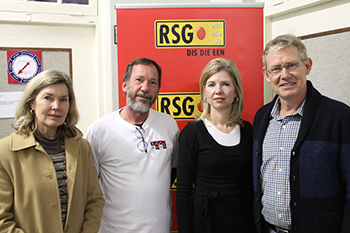Latest News Archive
Please select Category, Year, and then Month to display items
12 October 2020
|
Story Arina Engelbrecht
|
Photo Supplied
 Arina Engelbrecht from Organisational Development and Employee Well-being believes physical activity has a number of benefits for one’s health, including stress relief.
Arina Engelbrecht from Organisational Development and Employee Well-being believes physical activity has a number of benefits for one’s health, including stress relief.
Being physically active plays a big role in preventing the development of mental-health problems and in improving the quality of life of people experiencing mental-health problems.
Treatment for depression
Physical activity can be an alternative treatment for depression. It can be used as a stand-alone treatment or in combination with medication and/or psychological therapy. It promotes all kinds of changes in the brain, including neural growth, reduced inflammation, and new activity patterns are formed that promote feelings of calm and well-being. It releases endorphins – powerful chemicals in the brain that energise your spirit and make you feel good.
Physical activity can be very effective in relieving stress. Research in adults has found that physically active individuals tend to have lower stress levels compared to individuals who are less active. It also leads to improved sleep. When a person sleeps better and feels more rested, overall quality of life improves. They cope better with daily life stressors.
Reduce Alzheimer's risk
Regular physical activity can reduce your risk of developing Alzheimer's disease by up to 50%. It can also slow down further deterioration in those who have already started to develop cognitive problems. It stimulates the brain’s ability to maintain old connections as well as to make new ones.
A study asked people to rate their mood immediately after periods of physical activity (e.g. going for a walk/run, cycling, doing housework) and periods of inactivity (e.g. reading a book or watching television). Researchers found that participants felt more content, more awake, and calmer after being physically active compared to after periods of inactivity.
In conclusion, people who are physically active feel a sense of well-being, feel more energetic throughout the day, sleep better at night, have sharper memories, and feel more relaxed and positive about themselves and their lives.
“Being physically active not only changes your body, it changes your mind,
attitude, and your mood.” – Arina Engelbrecht
RSG Crossword Tournament helps to celebrate language
2016-07-27

Dr Annette de Wet (left), Assistant Director
of the Unit for Language Development in
the Centre for Teaching and Learning at
the UFS, Albe Grobbelaar from XWord,
Prof Angelique van Niekerk, Head of the
Department of Afrikaans and Dutch, German
and French, and Prof Lucius Botes, Dean of the
Faculty of the Humanities, during the launch
of the RSG Crossword Tournament.
Photo: Jóhann Thormählen
Sometimes it is difficult for language departments to be topical and to show their relevance for the people out there. However, with the RSG Crossword Tournament, this became possible and Afrikaans could be celebrated in a positive manner. This is what Prof Angelique van Niekerk, Head of the Department of Afrikaans and Dutch, German and French at the University of the Free State (UFS), had to say about this initiative.
Interest during the Vrystaat Arts Festival exceeded all expectations. Altogether, 46 participants from across the country participated on 15 and 16 July 2016. Ilse van Hemert from Pretoria was crowned as the first South African crossword champion.
New dimension to language milieu
Prof Van Niekerk said people are familiar with crossword puzzles from the media, and it was the first time that a tournament like this was presented to the public in South Africa. “This tournament brings something like linguistics and linguistic sensitivity to the fore,” she said. “It is another dimension of the language milieu.” This is exactly why her department would like to see it grow in future.
Wordplay serves as inspiration
The idea for the tournament is based loosely on the film, Wordplay (2006), which is set in New York, and the annual New York Times Crossword Tournament. The South African Tournament was presented in conjunction with the crossword group, XWord, Prof Van Niekerk’s department, and the radio station RSG as brand sponsor.
Crossword puzzles and blockbusters crosswords completed
“This tournament brings something like
linguistics and linguistic sensitivity to
the fore.”
Albe Grobbelaar from XWord said the winners were determined on a points basis. “Competitors had to complete two crossword puzzles and one blockbuster crossword. The difference between the two is that a blockbuster’s clues are within the blocks or grid, but with the crossword, you have white and black blocks with the clues separate on the outside.”